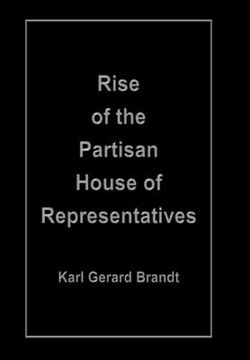Reseña del libro "Rise of the Partisan House of Representatives (en Inglés)"
This book examines changes in the U. S. House of Representatives and their effects on the nation's politics by following the careers of three Southern Democrats: Wright Patman of Texas, Bob Poage of Texas, and Felix Edward "Eddy" Hebert of Louisiana. These three men entered the House in 1929, 1937, and 1941, respectively, and during much of their careers, the House operated under a distinct set of ideas and practices that featured party leaders with limited powers, autonomous committee chairmen, seniority, traditional House customs, significant regional and ideological blocs, weak party discipline, and cooperation across partisan and ideological lines. All three men rose to power through the seniority system; the seniority system was the well-respected custom of awarding the chairmanship of a committee to the member of the majority party with the longest service on that committee. During their careers, all three men found themselves in controversies and made political enemies. Over time, the nation changed, and the House changed, too. A Congressional reform movement emerged, and liberal Democrats from the North and the West composed the bulk of the movement. The movement used the Democratic Study Group (DSG) as the primary means of advancing its goals of stronger party authority and weaker committee chairmen. The movement believed the chairmen, who frequently were Southern conservatives, impeded progressive legislation and acted autocratically. The Congressional reform movement succeeded in gradually reforming House and Democratic Party rules. By the early 1970s, the power structure of the House had been reformed, and a method of popular election for committee chairmen was created. Yet, the reforms had not been fully utilized. The same chairmen held power, and many of the older ideas and practices remained. The Watergate Scandal greatly impacted the nation, and one of the results was a new demand for accountability. The elections of 1974 featured the election of seventy-five freshmen House Democrats who collectively possessed a strong desire to challenge the status quo and advance some type of reform. They focused their attention on the committee chairmen and the issue of autocratic management of the committees. In 1975, the political enemies of these three chairmen, the Congressional reform movement, and the freshmen Democrats formed a coalition that removed Patman, Poage, and Hebert from their chairmanships by popular vote in the House Democratic Caucus. No other incumbent chairmen were removed. The careers of Patman, Poage, and Hebert concluded within a few years, but the ramifications of their removal affected the entire House and the nation's politics. The removal proved that the reforms would be fully utilized, and the seniority system was overturned both in the rules and in actual practice. The removal marked the decline of the set of ideas and practices that had earlier governed the House. The reforms promoted by the Congressional reform movement became entrenched and facilitated the rise of a much more partisan House characterized by stronger party leaders and institutions, a greater stress on party unity and discipline, greater uniformity among party members regarding ideology and voting, and a more partisan approach towards the work of the House. This trend began after the 1975 removal, accelerated in the 1980s, solidified in the 1990s, and became institutionalized in the twenty-first century.

